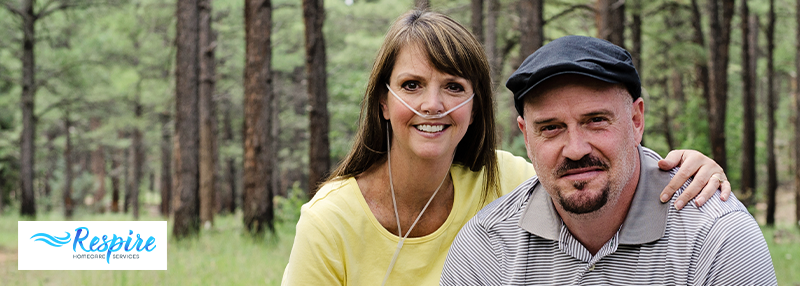Respire Homecare
Updated 10:53 AM CST, Mon November 11, 2024
Published Under: COPD Lung Health Oxygen Concentrator Safety Tips Traveling Tips

Are you living with Chronic Obstructive Pulmonary Disease (COPD) and wondering if you can still travel and explore the world? The answer is yes! With some planning and preparation, you can enjoy a stress-free and enjoyable trip despite your COPD diagnosis.
Before You Go
Before planning your trip, it's essential to consult with your healthcare provider to ensure you're healthy enough for travel. Discuss your travel plans with your doctor and ask for their advice on managing your COPD while away from home. Also, be sure to research your destination to understand the local environment, air quality, and availability of medical resources. This will help you prepare for any potential challenges and make informed decisions about your trip.Packing Essentials
- Medications: Pack all your medications, including inhalers, nebulizers, and oxygen therapy equipment, in your carry-on luggage. Be sure to bring a copy of your prescription and a letter from your doctor explaining your condition.
- Oxygen Therapy: If you use oxygen therapy, arrange for portable oxygen equipment or make arrangements for oxygen delivery at your destination.
- COPD Action Plan: Create a COPD action plan with your doctor, outlining what to do in case of an exacerbation or emergency.
- Comfort Items: Pack comfortable clothing, a scarf or mask to protect yourself from air pollution, and a pulse oximeter to monitor your oxygen levels.
During Travel
Try to avoid dry air and other irritants such as smoke, pollution, and strong odors, which can trigger COPD symptoms. Additionally, it’s important to drink plenty of water to stay hydrated and avoid caffeine and alcohol, as they can exacerbate COPD symptoms.Air Travel
- Book a Direct Flight: Non-stop flights can reduce the risk of exacerbations caused by layovers and flight changes.
- Choose a Seat Near the Front: Sitting near the front of the plane can reduce exposure to air pollution and make it easier to access the lavatory. Additionally, paying for added leg room will help reduce comfort.
- Consider Travel Insurance: Traveling can entail a multitude of risks, and one is potential for medical emergencies. Travel insurance may be a great investment if you are at high risk or would like extra peace of mind.
- Bring a Travel Companion: Consider bringing a travel companion to assist with luggage, provide emotional support, and help in case of an emergency.
Road Trips
- Plan for Regular Breaks: Take regular breaks every hour to stretch, move around, and get some fresh air.
- Pack a COPD Emergency Kit: Include a first-aid kit, medications, and a phone charger in your vehicle.
- Avoid Heavy Traffic: Plan your route to avoid heavy traffic and construction zones, which can exacerbate COPD symptoms.
Accommodations
- Book a Room with a Humidifier: Dry air can exacerbate COPD symptoms, so booking a room with a humidifier can help keep your airways moist.
- Request a Room on a Lower Floor: If you have mobility issues, request a room on a lower floor to reduce the need for excessive walking or climbing.
- Research Local Healthcare: Research local healthcare options and hospitals near your destination in case of an emergency.
Staying Active
- Pack a Portable Oxygen Tank: If you use oxygen therapy, consider packing a portable oxygen tank to stay active and mobile during your trip.
- Choose COPD-Friendly Activities: Opt for low-exertion activities, such as walking or yoga, to avoid exacerbating your symptoms.
- Stay Connected: Stay connected with family and friends back home to reduce feelings of loneliness and isolation.
Additional Tips
- Take Breaks: Take regular breaks to rest and catch your breath, especially during physical activities. Listen to your body and know your limits. If you feel unwell, don’t hesitate to seek medical attention. It’s better to be cautious and safe.
- Manage Your Stress: Traveling can be stressful, which can worsen COPD symptoms. Take moments during your breaks to practice relaxation techniques such as deep breathing, meditation, or listening to calming music.
- Stay Connected: Keep in touch with family or friends and let them know your travel plans. Regular check-ins can provide peace of mind for both you and your loved ones.
- Be Prepared for Emergencies: Carrying a list of emergency contacts, a copy of your medical ID card, and a small first-aid kit for any potential emergencies.
- Enjoy Yourself: Remember to enjoy yourself and prioritize your well-being during your trip. Don't let COPD hold you back from experiencing new adventures and making memories.
Comments